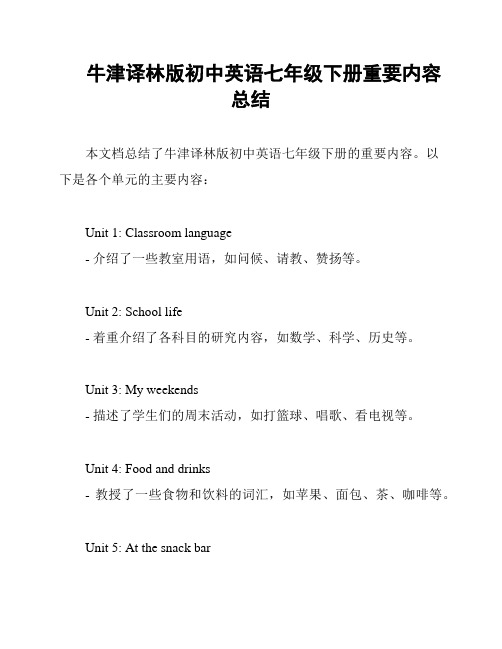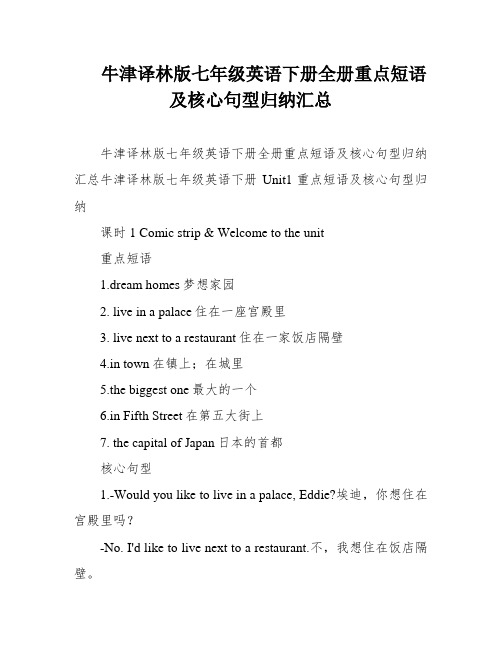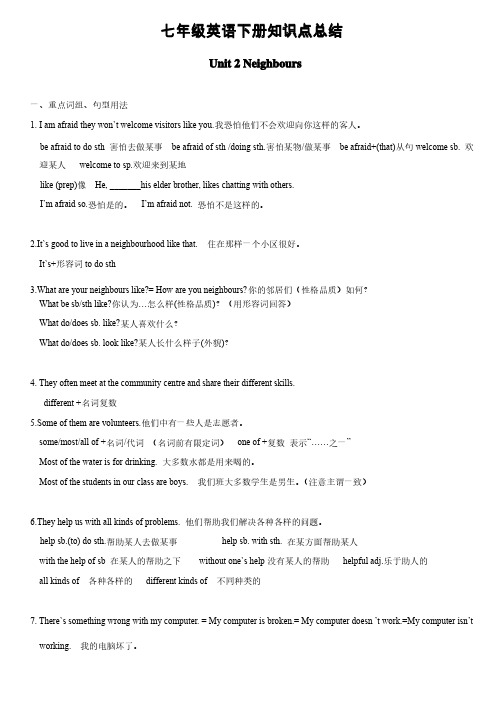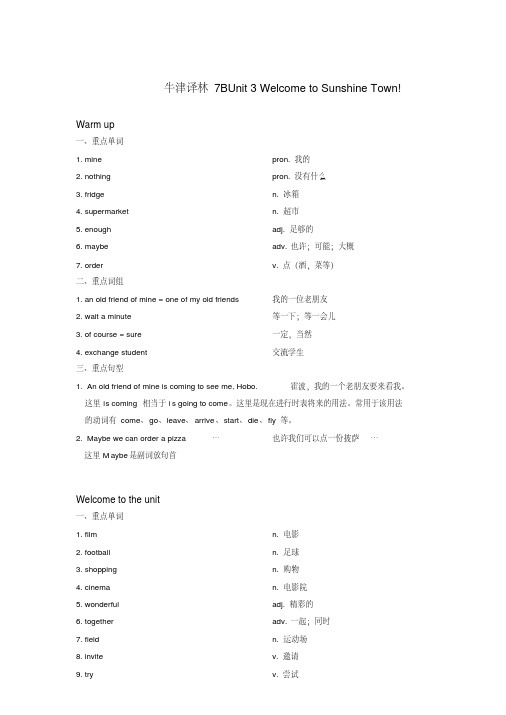牛津译林英语七年级下册全册知识点汇总
牛津译林版初中英语七年级下册重要内容总结

牛津译林版初中英语七年级下册重要内容
总结
本文档总结了牛津译林版初中英语七年级下册的重要内容。
以
下是各个单元的主要内容:
Unit 1: Classroom language
- 介绍了一些教室用语,如问候、请教、赞扬等。
Unit 2: School life
- 着重介绍了各科目的研究内容,如数学、科学、历史等。
Unit 3: My weekends
- 描述了学生们的周末活动,如打篮球、唱歌、看电视等。
Unit 4: Food and drinks
- 教授了一些食物和饮料的词汇,如苹果、面包、茶、咖啡等。
Unit 5: At the snack bar
- 研究了在小吃店点餐的常用句型,如“What would you like?”、“Here you are.”等。
Unit 6: Festivals and celebrations
- 介绍了一些重要的节日和庆祝活动,如春节、圣诞节、生日等。
Unit 7: Hobbies
- 研究了各种爱好和运动,如阅读、游泳、踢足球等。
Unit 8: At the zoo
- 通过描述动物的外貌和生活性,使学生了解不同的动物种类。
Unit 9: My body and health
- 关注了身体部位和健康问题,如头、肚子、感冒、发烧等。
Unit 10: My family
- 描述了家庭成员的关系和工作,如爸爸、妈妈、姐姐、弟弟等。
这些是牛津译林版初中英语七年级下册的重要内容总结。
希望能对您有所帮助!。
Unit 2 知识点梳理-牛津译林版七年级英语下册

牛津译林版七下Unit 2 知识点梳理1.Where are you going?你要去哪儿?现在进行时表将来。
现在进行时可用于表示计划或安排将要发生的动作,go,come,leave等表示位移的动词,都可以用现在进行时表示将来。
2.I’m going to visit our new neighbours. 我打算去拜访我们的新邻居。
neighbour “附近的人或物”(侧重指人)neighbourhood “邻近街区,居民区”(侧重指地方)3.I’m afraid they won’t welcome visitors like you. 恐怕他们不会欢迎像你这样的客人。
I’m afraid + (that) 从句. “恐怕……”,常有“抱歉”之意。
I’m afraid not.(恐怕不是)I’m afraid so.(恐怕如此)be afraid to do sth.“害怕/不敢去做某事”be afraid of sb./sth.“害怕某人/某物”be afraid of doing sth. “害怕/担心做某事”be afraid for “为……担心”visitor:n. “访问者,参观者”动词加-er或-or变成名词,表示从事该职业的人。
like:prep. “像……一样,相似”。
反义:unlikelook like “看起来像”;be like “像”辨析:like/aslike:强调“如同……一样,如……一般”。
用于相似关系,即两者在形态上或者性质上有相似之处,但并不等同。
as:表示“以……的身份;作为”。
用于说明同一关系,即两者实为一体。
作动词,“喜欢”。
like doing sth.“喜欢做某事”。
4.How many buildings are there in your neighbourhood? 在你的居民区里有多少幢楼?how相关短语:how much:“多少”,提问物品价格或不可数名词。
牛津译林版七年级下英语知识点总结

牛津译林版七年级下英语知识点总结1."Would you like to do something?"Positive answer: "Yes。
I'd/we'd like/love to."Negative answer: "I'd/we'd like/love to。
but。
" or "Sorry。
I'm/We're afraid not."2."Next to" means near or beside.3."One" refers to any one of the same type of thing ned earlier。
"It" refers to the same thing ned earlier.4."Be from" means to come from.5."The capital of" refers to the capital or provincial capital ofa place.6."Around the world," "in the world," and "all over the world" all mean globally.7."Enjoy oneself," "have a good time," and "have fun doing something" all mean to have a good experience doing something.8."In the centre of" means in the middle of.9."Share something with someone" means to use or enjoy something together.10."Look out" means to look outside。
牛津译林版七年级英语下册全册重点短语及核心句型归纳汇总

牛津译林版七年级英语下册全册重点短语及核心句型归纳汇总牛津译林版七年级英语下册全册重点短语及核心句型归纳汇总牛津译林版七年级英语下册Unit1重点短语及核心句型归纳课时1 Comic strip & Welcome to the unit重点短语1.dream homes梦想家园2. live in a palace住在一座宫殿里3. live next to a restaurant住在一家饭店隔壁4.in town在镇上;在城里5.the biggest one最大的一个6.in Fifth Street在第五大街上7. the capital of Japan日本的首都核心句型1.-Would you like to live in a palace, Eddie?埃迪,你想住在宫殿里吗?-No. I'd like to live next to a restaurant.不,我想住在饭店隔壁。
2.Which is your favourite?哪一个是你最喜欢的?3.-Is Tokyo the capital of Japan?东京是日本的都城吗?-Yes,it is.是的,它是。
课时2 Reading重点短语1.homes around the world天下各地的故里2. live in a town 15 miles from London住在离伦敦十五英里的一个镇上3.enjoy a cup of tea品(享受)一杯茶4. have fun with my dog there和我的狗一起在那儿玩得开心5.live in a flat in the centre of Moscow住在莫斯科市中央的一座公寓里6.on the seventh floor在八楼7.share a bedroom with my sister和我mm同住一间寝室8.listen to music in bed在床上听音乐9.have my own bedroom有我自己的卧室10.like the balcony best最喜欢阳台11.look out at the beach and the sea向外远望海滩和大海12. homes in different countries不同国家的家园13.the best place to chat and watch TV聊天和看电视最好的地方14.in most homes在大多半家庭里15.cook meals in the kitchen在厨房做饭16.share sth. with sb.与或人适用/分享某物17.dining room餐厅核心句型1.I live in a town 15 miles from London.我住在离伦敦十五英里的一个镇上。
译林版牛津英语七年级下册全册Unites1-8单元知识点及语法归纳

译林版牛津英语七年级下册全册Unites1-8单元知识
点及语法归纳
以下是译林版牛津英语七年级下册全册Unites1-8单元的知识点及语法归纳。
Unit 1 Knowing about yourself 知识点:
1. 询问和介绍自己的姓名、年龄、国籍以及所在地等。
2. 描述自己的外貌特征、爱好和能力。
3. 学习使用形容词、副词、名词、动词等词汇来构造自己的句子。
4. 学会听、说、读、写26个字母。
语法归纳:
1. 人称代词:I, you, he, she, it, we, they.
2. 动词be的各种形式(am, is, are)。
3. 形容词的比较级和最高级形式。
4. 副词和形容词的用法。
5. 一般现在时的肯定句、否定句及一般疑问句。
Unit 2 Disaster zone 知识点:
1. 描述自然灾害的发生和后果。
2. 学习句式\。
牛津译林版七年级英语下册7B unit1 重点单词+词组+句子(分课时整理)

7BUnit 1 Dream homes Welcome to the unit一、重点单词梦想dream-宫殿palace-饭店restaurant-照片photo-花园garden起居室living room-中心centre-合用,分享share-伦敦London-卧室bedroom公寓,套房-自己的own-浴室bathroom-阳台balcony-海滩beach二十twenty-城镇town-最喜欢的favourite-国家country-首都capital加拿大Canada-法国France-日本Japan-俄国Russia-英国the UK二、重点短语梦想的家园dream homes-住在皇宫里live in a palace住在餐馆隔壁live next to a restaurant-在镇上in town二十家饭店twenty restaurants-第五大街最大的那个the biggest one in Fifth Street国家和首都countries and capitals-富士山Mount Fuji白宫the white House-埃菲尔铁塔the Eiffel Tower加拿大国家电视塔the CN Tower-大本钟Big Ben红场Red Square-天安门广场Tian’anmen Square三、重点句子你想要住在宫殿里吗?Would you like to live in a palace?我想要住在餐馆隔壁。
I would like to live next to a restaurant.镇上有二十家饭店,哪一家是你的最爱?There are twenty restaurants in town. Which is your favourite? 第五大街最大的那个。
The biggest one in Fifth Street.这张照片来自哪个国家?Which country is this photo from?它来自日本。
译林版牛津英语七年级下册全册Unit2单元知识点及语法归纳

七年级英语下册知识点总结Unit 2 Neighbours一、重点词组、句型用法一、重点词组、句型用法1. I am afraid they won`t welcome visitors like you.我恐怕他们不会欢迎向你这样的客人。
我恐怕他们不会欢迎向你这样的客人。
be afraid to do sth 害怕去做某事害怕去做某事 be afraid of sth /doing sth.害怕某物/做某事做某事be afraid+(that)从句welcome sb. 欢迎某人迎某人 welcome to sp.欢迎来到某地欢迎来到某地like (prep)像He, _______his elder brother, likes chatting with others. I’m afraid so.恐怕是的。
恐怕是的。
I’m afraid not. 恐怕不是这样的。
恐怕不是这样的。
2.It`s good to live in a neighbourhood like that. 住在那样一个小区很好。
住在那样一个小区很好。
It`s+形容词to do sth3.What are your neighbours like?= How are you neighbours?你的邻居们(性格品质)如何?你的邻居们(性格品质)如何?What be sb/sth like?你认为…怎么样(性格品质)?(用形容词回答)?(用形容词回答)What do/does sb. like?某人喜欢什么?某人喜欢什么?What do/does sb. look like?某人长什么样子(外貌)?4. They often meet at the community centre and share their different skills.different +名词复数名词复数5.Some of them are volunteers.他们中有一些人是志愿者。
牛津译林七年级英语下册7BUnit3课本知识整理

牛津译林7BUnit 3 Welcome to Sunshine Town!Warm up一、重点单词1. mine pron. 我的2. nothing pron. 没有什么3. fridge n. 冰箱4. supermarket n. 超市5. enough adj. 足够的6. maybe adv. 也许;可能;大概7. order v. 点(酒,菜等)二、重点词组1. an old friend of mine = one of my old friends我的一位老朋友2. wait a minute等一下;等一会儿3. of course = sure一定,当然4. exchange student交流学生三、重点句型1. An old friend of mine is coming to see me, Hobo.霍波,我的一个老朋友要来看我。
这里is coming 相当于i s going to come。
这里是现在进行时表将来的用法。
常用于该用法的动词有come、go、leave、arrive、start、die、fly 等。
2. Maybe we can order a pizza…也许我们可以点一份披萨…这里M aybe 是副词放句首Welcome to the unit一、重点单词1. film n. 电影2. football n. 足球3. shopping n. 购物4. cinema n. 电影院5. wonderful adj. 精彩的6. together adv. 一起;同时7. field n. 运动场8. invite v. 邀请9. try v. 尝试二、重点词组1. talk about sth.谈论某事2. take sb. to sp.带某人去某地3. invite ab. to do sth.邀请某人做某事4. I’d like to do = I want to do我想去做...三、重点句型1. We can watch some wonderful films together.我们可以一起去看一些精彩的电影。
- 1、下载文档前请自行甄别文档内容的完整性,平台不提供额外的编辑、内容补充、找答案等附加服务。
- 2、"仅部分预览"的文档,不可在线预览部分如存在完整性等问题,可反馈申请退款(可完整预览的文档不适用该条件!)。
- 3、如文档侵犯您的权益,请联系客服反馈,我们会尽快为您处理(人工客服工作时间:9:00-18:30)。
牛津译林英语七年级下册全册知识点汇总7B Unit11.would like 的用法①would like意为“想要”,相当于want,没有人称和数的变化。
其后常接动词不定式(即todo形式),表示“想做某事”。
①Would you like to do sth.?意为“你(们)愿意/想做某事吗?”,常用于有礼貌地提出邀请、请求或建议。
I would like to help you.我愿意帮你。
Would you like to watch the basketball game with me?你愿意和我一起观看这场篮球比赛吗?①后接名词或代词,表示“想要某物”。
My mother would like an apple. 我妈妈想要个苹果。
④ would like sb.to do sth.想要某人做基事。
I'd like you to meet them. 我想要你见见他们。
⑤Would you like.?意为“你(们)想要……吗?”,表示向对方提出客气的、有礼貌的请求、邀请、希望或询回等。
Would you like a cup of tea?你想来杯茶吗?2.next to方位介词短语,意为“紧靠,紧邻,在……近旁”,后面直接加名词或代词,在句中作地点状语或表语。
Tom lives next to Daniel.汤姆住在丹尼尔隔壁。
Our class is next to theirs.我们班与他们班紧邻。
next to=beside,意为“在……旁边”。
My home is next to our school.=My home is beside our school.我家靠近我们的学校。
3.in town 在城里,在镇上in the town 在这座城里,the 表示特指4.Your watch is very beautiful.I want to buy one,too. 你的手表很漂亮,我也想买一块。
I have a pen.It is black. 我有一支钢笔。
它是黑色的。
5.country可数名词,意为(国家),其复数形式是countriesRussia,the USA and China are all big countries. 俄罗斯、美国和中国都是大国。
6.be from意为“来自于”,相当于come from。
This car is from Germany.=This car comes from Germany.这辆小汽车来自于德国。
Where is the girl from?=Where does the girl come from?这个女孩来自哪儿?7.capital可数名词,意为“首都;省会”。
the capital of+表示国家或省的名词…的首都或省会8.9.centre 名词“中心”in the centre of 在.....的中心10.This is the shopping centre of the town. 这是这个城镇的购物We have lunch in the middle of the day.我们在中午吃午饭。
It's dangerous to stand in the middle of the road.站在路中间是危险的。
11.in bed (躺)在床上Reading books in bed is bad for our eyes. 躺在床上看书对我们的眼睛有害。
on the bed 在床上There is a book on the bed. 床上有一本书。
make the bed 整理床铺We should learn how to make the bed. 我们应该学会如何整理床铺。
12.own①形容词“自己的”,常与形容词性物主代词连用。
one's own..意为“某人自己的……”。
She makes all her own clothes. 她的衣服都是自己做的。
The writer has his own study at home. 这位作家在家里有他自己的书房。
②代词“自己的”This house is his own.(=This is his own house.)这所房子是他自己的。
(=这是他自己的房子。
)③on one's own意为“独立地”。
You should answer this question on your own. 你应该独立回答这个问题。
④动词“拥有”=haveI own a new flat.=I have a new flat. 我有一套新公寓。
⑤owner可数名词“主人,拥有者”He is the owner of the car. 他是这辆小汽车的主人。
13look out“向外看”look out at sth.“向外看某物”look out of..“向……外看”We can look out at that beautiful garden from our balcony.我们可从阳台上向外看到那个漂亮的花园。
Don't look out of the window.Listen to me. 不要向窗外看,听我说。
13.beach可数名词“海滩”其复数形式为beaches。
on the beach“在海滩上”Many people are walking on the beach. 很多人正在海滩上散步。
15.foot名词“英尽”“脚,足”,复数形式feet,意为。
The mountain is about 3,500 feet high. 这座山大约3500英尺高。
A dog has four feet.狗有4只脚。
foot的复数形式是feet,类似的还有tooth,意为“牙齿”,其复数形式是teeth。
We brush our teeth twice a day. 我们一天刷牙两次。
1,815feet tall意为“1815英尺高”。
“sth.+be+数词+表单位的词+形容词(长、宽、高、深等)”表示“某物……长/宽/高/深等”。
The bridge is 10 meters wide and 50 meters long.这座桥10米宽、50米长。
16.I'm about 1.6metres tall. 我大约1.6米高。
The mountain is too high. 这座山太高了。
He can jump high. 他能跳得很高。
17.square①可数名词“广场”。
There is a large square in our city. 在我们城市有一个大广场。
Tian'anmen Square is in Beijing. 天安门广场在北京。
②形容词“平方的”。
The room is 200 square meters. 这个房间有200平方米。
③形容词讲时“正方形的”The window is square. 这扇窗子是正方形的。
18.have an area of “占……面积”=in sizeThe country has an area of 600,000 square kilometres.=The country is 600,000 square kilometers in size.这个国家的面积为60万平方千米。
19.over 介词“超过”=more than。
My father is over forty.我父亲40多岁了。
一How many books do you have?你有多少本书?一Over ten.10多本。
20.“在某处有某人或某物正在做……”。
There is a/an+单数可数名词+v-ing+地点状语There are+可数名词复数+v.-ing+地点状语。
There is a baby sleeping in the room. 房间里有一个宝宝正在睡觉。
There are some boys playing games on the grass. 草地上有一些男孩正在玩游戏。
21.fork可数名词“叉;餐叉”,复数形式forks。
People in the west eat with forks.西方人用叉子吃饭。
a knife and fork意为“一副刀叉”,作主语时,谓语动词用单数形式。
There is a knife and fork on the table. 桌子上有一副刀叉。
knife可数名词“(小)刀”其复数形式为knives。
I have two knives.我有两把刀。
以“f”或“fe”结尾的名词、变复数时,通常要把“f”或“fe”变为“-ves”巧记-f(e)结尾的名词灰太狼(wolf)为活命(life)去捉羊,扮贼(thief)携刀(knife)叶(leaf)丛藏。
架(shelf)后半(half)天不见喜羊羊,自己(self)老婆(wife)饿得慌。
22.shower可数名词“淋浴器”I want to buy two showers我想买两个淋浴器。
take a shower 淋浴Danny is taking a shower. 丹尼正在淋浴。
23.be full of“满是…….充满.……”介词of后接名词=be filled withThe room is full of books.=The room is filled with books. 房间里满是书。
Every child's future is full of hope. 每个孩子的未来都充满希望。
full 形容词“饱的”-Would you like some more fish?你想要再来点鱼吗?一No,thanks.I'm full.不了,谢谢。
我饱了。
24.hope sb.to do sth.“希望某人做某事”。
表达“希望某人做某事”可用“hope+宾语从句”结构。
My father hopes that I will be a good teacher.我父亲希望我成为一名好老师。
26.some day“将来的某一天,总有一天”,也可以写作someday,常用作副词,常用于将来时中,作时间状语。
Perhaps my dream will come true some day/someday.也许有一天我的梦想会实现。
Some day I will be a great man like Bill Gates.有朝一日,我会成为像比尔·盖茨一样伟大的人。
